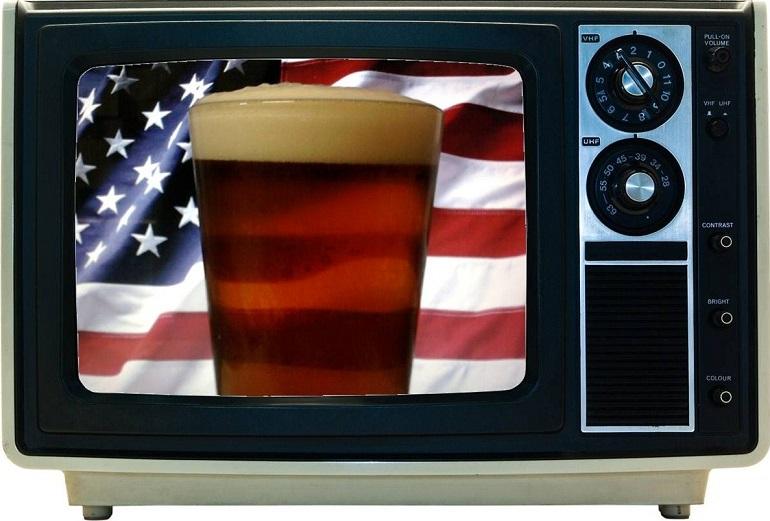Start 14-Day Trial Subscription
*No credit card required

Not Quite The Golden Age for Craft TV Ads
In light of an ongoing aggressive TV campaign by Anheuser-Busch that seeks to divide Budweiser drinkers from those who choose craft, how will craft brewers respond? Not with television advertising of their own.
In the coming year, only three craft brands are currently committed to TV advertising: Boston Beer Company, Boulevard Brewing Company and Matt Brewing Company, which has recently announced a new multi-platform campaign including TV advertising.
A survey of the top ten producers on the Brewers Association list of independent brewers found that Boston Beer, New Belgium Brewing Company and Boulevard are the only three to have run TV ad campaigns over the past 12 months.
"We've made a couple forays into television and it's been fun for us, exciting for our partners, and fairly expensive," said New Belgium’s Director of Public Relations Bryan Simpson, referring to the “Want A Beer” campaign launched in late 2013 in 12 regional markets. "These days we're still looking to video for great storytelling opportunities, but we like the digital online space for focused reach and deeper engagement. It's a little more cost-effective and generates a two-way dialogue with beer drinkers, which is just how we like it."
Direct personal engagement through digital and social media continues to be the major focus of all craft brewers – an approach that recently included parody videos of A-B’s divisive “Brewed the Hard Way.”
Craft brewers not only like the cost-effectiveness of digital media, but are wary of presenting themselves in the same light as macro brewers.
“It was a cautious decision to start advertising on TV,” said Boulevard’s Marketing Director Jeremy Ragonese. Since 2008, the company has been the official sponsor of the hometown Kansas City Royals post-game show on the city’s Fox Sports affiliate.
“Boulevard has a very high awareness in the local market,” said Ragonese. “TV was a method to reinforce our message and continue to establish that we are the hometown beer. There was a fear that we might turn off consumers and that we would look too large for who we really were. But it’s hard to dispute the appeal of TV advertising and its efficiency.”
For Boulevard, that efficiency includes coverage on Fox Sports in a 250-mile radius outside of Kansas City. But even Ragonese continues to tout the effectiveness of the digital approach.
“We still find reaching our consumer on a personal basis through social media or sampling to be the most effective in establishing that emotional connection with the consumer,” he said.
Matt Brewing, 11th on the BA’s list, has decided to exploit the impact of TV advertising this year with its “Pour Your Soul Into It” series, which underscores the company’s history in the craft beer segment and its planned experimentation with limited releases and one-off brews.
For the family-operated company behind the Saranac brand, TV is an opportunity to remind viewers of the company’s long history of independent brewing. “Few people know the depth behind the brewery, much less the Saranac brand,” said Fred Matt, president of Saranac. “We sometimes even got accused of ‘globbing on’ to the craft movement, which couldn’t be further from the truth.”
Boston Beer, first on the BA’s list, is expected to continue its regular spots on national TV and perhaps up the advertising ante. In the company’s most recent quarterly conference call, CEO Martin Roper cited a tougher environment and increased competition from new brewers and macros like AB-InBev, which some analysts believe will lead to an increase in TV advertising.
Sierra Nevada Brewing Company also ran TV ads during the past 12 months, but those emerged from a dedicated sponsorship of the 2014 USA Pro Challenge. The ads ran as 30-second spots during broadcasts of the cycling events on NBC Sports.
Sierra Nevada Beer Ambassador Bill Manley elaborated on the brewery’s position. “The advantage of digital video is that you can target your audience a little bit better. It’s easier to get your beer in front of the people who drink your beer. We produce a lot of content in-house and we can put it in front of people who are already familiar with our brands.”
Sierra Nevada is also cautious about the reach of TV and the message it can send. “The larger the audience, as with TV, the less specific your end user market gets,” said Manley. “We like to follow a more soft-spoken approach that is consistent with Sierra Nevada and how we do things.”
Advertising in association with local events does attract craft brewers to TV from time to time. The Gambrinus Company, which owns the Shiner and Bridgeport brands, is fourth on the BA’s top 50 list. Anne Raabe, PR Director at Spoetzl Brewery (makers of Shiner), said if the brand does advertise on TV, it is done in local Texas markets and usually with a corresponding event.
The approach of Ommegang Brewery in New York is far less committed to TV advertising than sister brewery Boulevard. Both companies are owned by Duvel Moortgat USA, which is eighth on the BA list. “We partnered for a few TV ads to promote an event we sponsored last fall,” said Allison Copozza, Publicity Manager for Ommegang.
Despite a few outliers, the consensus by the BA’s top 10 seems to be that TV ads in the craft segment are expensive and often superfluous. “Quite frankly we can’t afford them,” said Ben Hudson, Brooklyn Brewery’s marketing director. “We don't really watch TV ads and don't feel that our customers and potential customers trust mainstream advertising methods. We would rather invest in experiential event-based activities or developing in-house video.” The company has just released its Mash Tour 2015 video online, which features high-end animated artistry and soulful music.
Stone Brewing Company is renowned for its anti-advertising policy, focusing instead on risqué beer names and extreme flavors to raise its profile. Dogfish Head Brewery, 13th on the BA’s list, has a thriving YouTube channel and posts self-produced videos to correspond with beer releases and news stories involving its renowned brand.
Photogenic brewery founder Sam Calagione is almost always present in these videos, confirming that making a personal connection through digital story telling is the main focus of the brewery’s marketing strategy.



